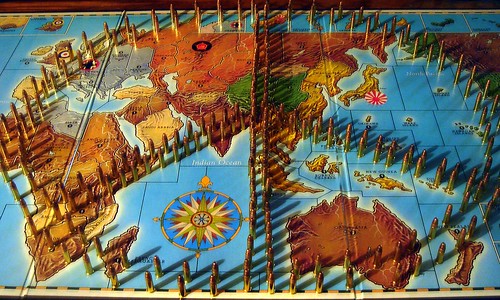 The Trans-Pacific Partnership (TPP) talks involve delegations from Australia, Brunei Darussalam, Canada, Chile, Japan, Malaysia, Mexico, New Zealand, Peru, Singapore, the United States, and Vietnam. Right now a TPP Chief Negotiators summit is drawing to a close in Salt Lake City, Utah.
The Trans-Pacific Partnership (TPP) talks involve delegations from Australia, Brunei Darussalam, Canada, Chile, Japan, Malaysia, Mexico, New Zealand, Peru, Singapore, the United States, and Vietnam. Right now a TPP Chief Negotiators summit is drawing to a close in Salt Lake City, Utah.The talks are technically conducted in secret. However there seems to be a constant stream of leaked drafts and other documents. This in turn leads to a lot of comment from civil libertarians, fugitives and academics.
The latest document I came across is the confidential draft treaty chapter from the Intellectual Property group. It sets out the combined positions of all the parties as they were by the end of August 2013. Assuming this document is not a complete fabrication, what are the parties saying about the sort of technology that should be eligible for patent protection?
Patentable subject matter
The text contains the provision that:
'each Party shall make patents available for any invention, whether a product or process, in all fields of technology, provided that the invention is new, involves an inventive step, and is capable of industrial application'. [Article QQ.E.1]This provision makes sense. Those familiar with TRIPS (agreement on trade-related aspects of intellectual property rights) will see a passing similarity with TRIPS Article 27.
There is a slight divergence in policy between Australia and New Zealand. Australia would like to add that 'patents shall be available for any new uses or methods of using a known product'. New Zealand would not.
Morality
The text proposes that:
'each party may exclude from patentability inventions, the prevention within their territory of the commercial exploitation of which is necessary to protect ordre public or morality, including to protect human, animal or plant life or health or to avoid serious prejudice to nature or the environment, provided that such exclusion is not made merely because the exploitation is prohibited by their law'. [Article 2].No parties object to this statement, which is not really surprising.
New Zealand already has this provision in the Patents Act 2013 section 15. Australia has just concluded consultation on whether or not to exclude inventions from patentability where commercialization would be wholly offensive to the Australian public.
Subject matter exclusions
Most countries, with the exception of the United States, would like to exclude some subject matter from patentability.
New Zealand and Australia would like to be able to exclude:
- plants and animals other than microorganisms;
- diagnostic, therapeutic, and surgical methods for the treatment of humans or animals; and
- essentially biological processes for the production of plants or animals, other than non-biological and microbiological processes for such production.
These exclusions go beyond what is currently in section 16 of the New Zealand Patents Act 2013. The current provisions relate to humans only. Are we going to see New Zealand law amended to exclude patents for diagnostic, therapeutic and surgical method for the treatment of animals?
New Zealand wants to amend the text to require parties to 'provide for the protection of plant varieties either by patents or by an effective sui generis system or by any combination thereof'. This makes sense. Australia and New Zealand already have separate legislation for plant varieties.
Computer programs
All parties agree that they should make patents available for any invention in all fields of technology.
One of the parties to the agreement, New Zealand, has taken the position domestically that a computer program is not an invention. Section 11 of the New Zealand Patents Act 2013 says so. The logic is that if you assume that a computer program is not an invention in the first place then you don't have to make patents available for it.
As I have said in an earlier post, New Zealand will continue to grant patents for inventions that make use of or involve a computer program. It is the underlying technical function of the code that is patentable, rather than the code itself. New Zealand will continue to allow patents for technical functions that software code causes a processor to perform. New Zealand will continue to grant patents for computer-implemented inventions.
So what do other countries think? Are software patents a huge problem elsewhere? Is New Zealand's approach the way forward that every other country will rush to adopt?
Well, Mexico proposes an exclusion for:
'diagrams, plans, rules and methods for carrying out mental processes, playing games or doing business, and mathematical methods as such; software as such; methods to present information as such; and aesthetic creations and artistic or literary works'.You can read into that what you will. No other countries, even New Zealand, seem to want a specific exclusion for computer programs in the text of the treaty. This seems strange. If New Zealand has adopted this exclusion based on defensible sound policy, then why not join Mexico and suggest that this exclusion be included in the treaty text? Maybe the exclusion is not based on defensible sound policy.
Either the parties to the treaty (other than Mexico) have no issue with computer-implemented inventions. Or they each consider that the issue can be dealt with under their existing frameworks.
Further steps
I guess we wait and see the outcome of the next round of talks. There doesn't seem to be anything surprising or alarming in the approach of the parties to patentable subject matter. It's simply a matter of sitting back and waiting for the next leak.
Photo courtesy of author Rick Galvan under Creative Commons licence.
No comments:
Post a Comment